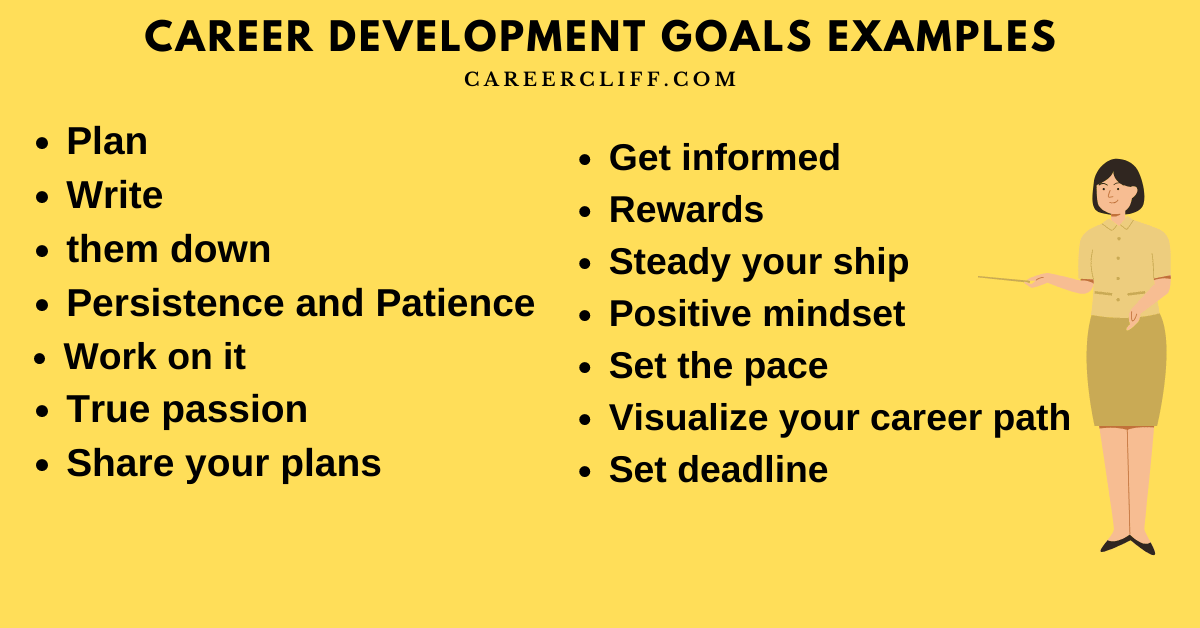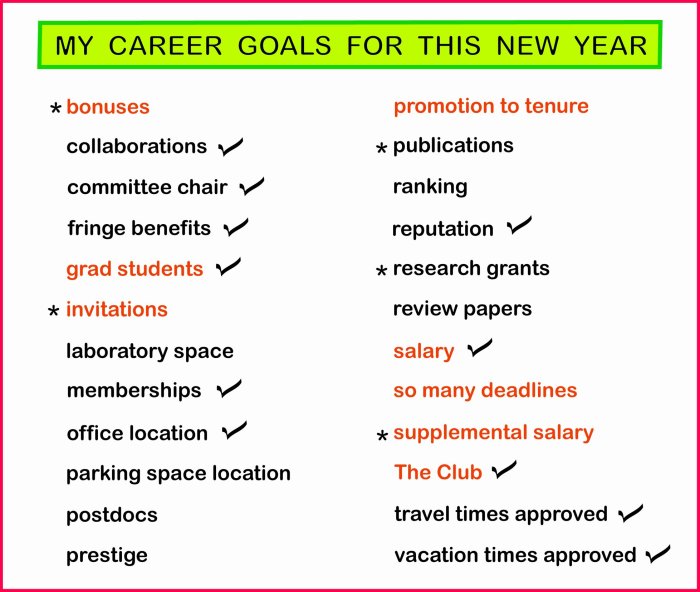Career Development Goals are the key to unlocking your full potential and achieving your dreams. Get ready for a journey filled with strategies, challenges, and triumphs as we delve into the world of professional growth and success.
From short-term aspirations to long-term visions, we will explore how setting clear goals can transform your career trajectory. So buckle up and let’s dive into the realm of career development!
Importance of Career Development Goals

Setting career development goals is crucial for professional growth as it provides a clear direction and purpose for your career path. Without goals, individuals may feel lost or stagnant in their careers, lacking motivation and drive to progress.
Enhanced Job Satisfaction and Motivation
- Clear career goals can enhance job satisfaction by giving employees a sense of accomplishment when they achieve their objectives.
- Having goals to work towards can also increase motivation levels, pushing individuals to strive for success and excel in their roles.
- Employees who are actively working towards their career goals are more likely to feel engaged and fulfilled in their work, leading to higher job satisfaction.
Impact on Overall Career Success
- Well-defined career goals help individuals stay focused on their long-term objectives, making it easier to make decisions that align with their aspirations.
- Having clear goals can also aid in prioritizing tasks and opportunities, ensuring that individuals are making progress towards their ultimate career vision.
- Individuals with defined career goals are more likely to seek out learning and development opportunities to enhance their skills and knowledge, ultimately leading to greater career success.
Types of Career Development Goals
Career development goals can be categorized into short-term and long-term goals, each serving a unique purpose in guiding an individual’s professional growth and success. Additionally, goals can be performance-based or learning-based, offering different avenues for skill enhancement and career advancement.
Short-Term Career Development Goals
Short-term career development goals are objectives that can be achieved within a relatively short period, usually within a few months to a year. These goals focus on immediate skill development, networking opportunities, and professional growth to enhance performance in the current role or prepare for advancement opportunities.
- Acquire a new certification or skill relevant to the current job role.
- Expand professional network by attending industry events or joining professional organizations.
- Enhance communication or leadership skills through training or workshops.
Long-Term Career Development Goals
Long-term career development goals are broader objectives that span a longer period, typically several years or even decades. These goals often involve strategic planning, continuous learning, and progression towards higher-level positions or career transitions.
- Attain a leadership role within the organization or industry.
- Obtain advanced degrees or certifications to specialize in a particular field.
- Transition to a different career path or start a business venture.
Performance-Based Goals vs. Learning-Based Goals
Performance-based goals focus on achieving specific outcomes or targets related to job performance, productivity, or results. These goals are often measurable and tied to key performance indicators, such as increasing sales revenue or meeting project deadlines.
On the other hand, learning-based goals prioritize acquiring new knowledge, skills, or competencies to enhance professional development and career growth. These goals emphasize continuous learning, personal development, and staying relevant in a rapidly changing work environment.
It is essential to strike a balance between performance-based and learning-based goals to ensure both short-term results and long-term career success.
Strategies for Setting Career Development Goals
Setting career development goals is crucial for long-term success and personal fulfillment. By aligning your career goals with your personal values and interests, you can create a roadmap for achieving success. Here are some effective strategies to help you set and achieve your career development goals.
Aligning Career Goals with Personal Values and Interests
One effective method for aligning career goals with personal values and interests is to take the time to reflect on what truly matters to you. Consider what activities or tasks bring you joy and fulfillment, and how they align with your core values. By understanding what motivates you and what you are passionate about, you can set career goals that are meaningful and fulfilling.
SMART Goal Setting in Career Development
SMART goal setting is a popular method for setting effective career development goals. SMART stands for Specific, Measurable, Achievable, Relevant, and Time-bound. When setting career goals, make sure they are specific, measurable, achievable, relevant to your long-term aspirations, and have a clear timeline for completion. This approach helps you stay focused and motivated as you work towards your objectives.
Creating a Roadmap for Achieving Career Development Goals
To create a roadmap for achieving your career development goals, start by breaking down your goals into smaller, actionable steps. Identify key milestones and deadlines to keep yourself on track. It’s also important to regularly assess your progress and make adjustments as needed. Additionally, consider seeking mentorship or guidance from professionals in your field to gain valuable insights and support along the way.
Overcoming Challenges in Achieving Career Development Goals

When it comes to pursuing career development goals, individuals often face various obstacles that can hinder their progress. It’s important to be aware of these challenges and have strategies in place to overcome them.
Common Obstacles in Pursuing Career Goals
Here are some common obstacles individuals face when working towards their career development goals:
- Resistance to change in current job role or industry.
- Lack of necessary skills or qualifications for advancement.
- Financial constraints limiting further education or training opportunities.
- Work-life balance issues impacting time and energy available for professional growth.
- Negative feedback or lack of support from colleagues or supervisors.
Strategies to Stay Motivated and Focused
Here are some strategies to help you stay motivated and focused when facing setbacks in your career development:
- Set small, achievable goals to track your progress and maintain a sense of accomplishment.
- Seek support from mentors, peers, or career coaches to gain perspective and advice.
- Practice self-care and maintain a healthy work-life balance to prevent burnout.
- Visualize your long-term career goals to stay motivated and remind yourself of your purpose.
- Celebrate small wins along the way to boost morale and keep momentum going.
Importance of Adaptability and Flexibility, Career Development Goals
Being adaptable and flexible in adjusting your career goals when necessary is crucial for long-term success. Here’s why:
-
Adaptability allows you to pivot in response to changing circumstances or opportunities in the job market.
-
Flexibility enables you to explore different paths or industries that may align better with your skills and interests.
-
Adjusting your goals based on feedback and new information shows resilience and a willingness to grow professionally.